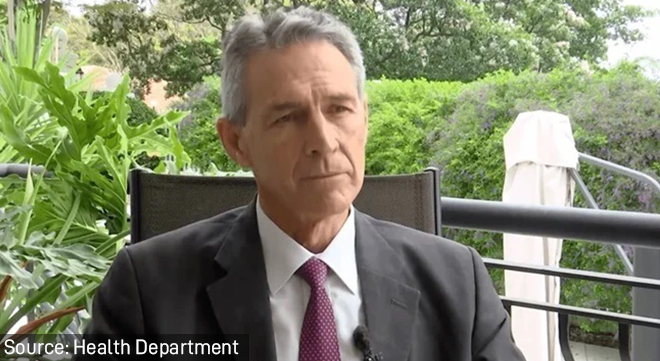South Africa can afford National Health Insurance (NHI), says Dr Nicholas Crisp (pictured), the deputy director-general in the Department of Health responsible for the implementation of the scheme.
The NHI Fund will only procure services and treatments that fall within the financial means of the economy. “NHI will purchase what the economy is able to pay for,” Crisp told the National Press Club on 29 February.
Two days before this event, trade union Solidarity lost a court case in which it attempted to stop the government’s preparations for NHI.
Crisp said areas of existing healthcare expenditure could readily be reallocated to support NHI.
Despite facing criticisms from various quarters about the affordability of NHI and the potential necessity of imposing new taxes, Crisp reiterated that the funding for NHI would involve repurposing existing financial resources rather than introducing additional taxes.
He said South Africa spends a large proportion of its annual GDP on healthcare – R277 billion in the private sector R265bn in the public sector – yet the outcomes are poor.
He said 14% of the population benefits from private sector healthcare spending, which makes up 51% of annual spending on healthcare.
Crisp outlined the need to overhaul private and public healthcare expenditure. He proposed reallocating existing funding sources, such as the medical scheme tax credits (R37bn a year) and government employees’ medical scheme subsidies (R70bn), to the NHI Fund to bolster its financial base.
He said centralised procurement will enable NHI to benefit from purchasing power. It will also avoid procurement duplication at a provincial level, reduce administration costs, and reduce over-servicing.
“We will squeeze the unit cost as low as we possibly can. No waste. No theft. No fraud. No duplication […] to get cash back to spend on healthcare,” Crisp said.
Solidarity fails to halt NHI decisions
Meanwhile, Solidarity has failed to stop the government from taking decisions that may bring the NHI Fund into operation.
Solidarity contended that taking the decisions before the NHI Bill had become law was unlawful and irrational and failed to respect the constitutional doctrine of the separation of powers.
The decisions that Solidarity sought to have reviewed and set aside included:
- A decision by the director-general of the Department of Health to recruit 44 technical specialists to assist with the preparation for the NHI Fund.
- The decision by the Minister of Health and the director-general to establish the NHI Branch within the department and to establish five chief directorates.
- National Treasury’s approval for the department to reallocate funds to compensate NHI employees.
Solidarity brought the application in the High Court in Pretoria against the Minister of Health, the director-general, and the Minister of Public Service and Administration.
Solidarity’s central contention was that it is ultra vires for a department of state to implement a Bill that is not yet law because a department of state cannot do what Parliament has yet to pass into law.
In a judgment handed down on 27 February, the court agreed with Solidarity’s contention but said it must be properly understood.
“If a power has not been conferred upon the Health Minister to act, he may not do so. That is the time-honoured postulate of the ultra vires doctrine and the principle of legality. And it matters not that the Health Minister anticipates that he will be given the power when the Bill enjoys the force of law. That does not mean, however, that the minister may not make organisational changes to the Department of Health to prepare and plan for the day that the Bill does become law,” Judge David Unterhalter said.
He said there is a distinction creating organisational capacity within a department in anticipation of proposed legislation becoming law and implementing that law. This distinction is fine, but it rests, ultimately, on what is done.
To configure the organisation, to create capacity, and to plan for change is not the same thing as taking administrative actions that assume a power not (yet) conferred.
There was no doubt that the respondents who took the decisions assumed the NHI Bill would become law, and the NHI Fund would be constituted as the Bill proposes.
“The executive authorities responsible for organising the public service in anticipation of significant law reform should recognise that Parliament decides what to legislate, and its deliberative process may yield outcomes that do not align with the legislation that was initiated by the responsible minister. Parliament is not, under the Constitution, an extension of executive authority. But nor can the executive authorities simply wait upon final presidential assent to legislation before anything is done in anticipation of legislative change,” Judge Unterhalter said.
He said the decisions were lawful because they propose actions that do not, ultimately, constitute the NHI Fund or commence its operation.
Although Solidarity’s challenge failed, the court rejected the respondents’ contention that the trade union did not have standing to bring the application.
Judge Unterhalter said workers and their representative organisations are an important constituency in our national life. “They, as with all South Africans, have an interest to ensure that the executive is organised to secure public goods in conformity with the law.”
Solidarity’s deputy chief executive, Anton van Bijl, said Solidarity was disappointed with the verdict, but it was “merely the opening salvo in our fight for the heart of healthcare”.
“The court has made it clear in its verdict that there is indeed a basis for us to launch these types of application [against NHI],” Business Day quoted Van Bijl as saying.
The trade union has yet to decide whether to seek leave to appeal against the ruling.
Solidarity is preparing to launch further legal action as soon as President Cyril Ramaphosa signs the NHI Bill into law.
Crisp said the judgment vindicated the department’s argument that it had not overstepped in hiring staff to do preparatory work for the massive reforms envisaged in the Bill, Business Day reported.



